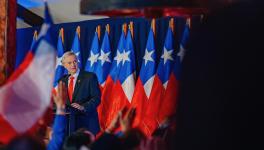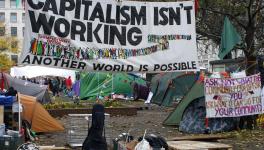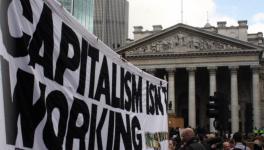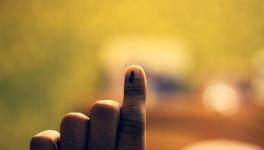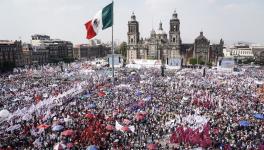Colombia Witnesses Massive National Strike
Tens of thousands of Colombians took part in a national strike, on October 21, to protest the social and economic policies of President Iván Duque. Photo: Darwin Torres / PCN
On October 21, tens of thousands of workers, peasants, teachers, students, Indigenous and Afro-descendant people took part in a new national strike in Colombia to protest against the social and economic policies of President Iván Duque. Demonstrations were held throughout the country in rejection of the economic crisis, rising unemployment, police repression, the increase in massacres, assassination of social leaders, armed group activity, among other issues.
In the capital Bogotá, hundreds of workers from diverse sectors hit the streets and marched towards the Plaza Bolívar, demanding a guaranteed basic income, greater budget for health, education and housing sectors, support for small and medium sized businesses and an end to the killings of human rights defenders and community leaders as well as women and LGBTQI community members. Trade unions also demanded the annulment of the Decree 1174, which imposes several regressive labor and pension reforms.
The mobilizations were accompanied by colorful banners, popular songs and traditional dances. Additionally, the police did not try to violently repress the peaceful protests against the increasingly authoritarian government.
Similar protests were also carried out in the cities of Armenia, Barranquilla, Bucaramanga, Cali, Cartagena, Cúcuta, Manizales, Medellín, Pamplona, Popayán, Villavicencio and Yopal. The call for the national strike was given by a large number of social organizations and trade unions such as the Central Union of Workers (CUT), the General Confederation of Labor (CGT), the Colombian Federation of Education Workers (Fecode) and the National Strike Committee (CNP), among others.
Diógenes Orjuela, the president of the CUT, in a tweet said that “the national strike expresses the feeling of more than 40 million Colombians who are struggling with hunger, lack of decent healthcare services, unemployment and the collapse of the MSMEs, millions of unemployed workers, violence against women and other citizens and uncertain educational opportunities.”
In Bogotá, the 8,000 participants of the “Social and Community Minga for the defense of life, territory, democracy and peace” from the southwestern region of Colombia, who arrived in the capital on October 18 to meet President Duque, also joined the strike. Minga is an Indigenous Quechua word and refers to collective action for the benefit of the community. The participants of the Minga demanded that the national government take immediate measures to put an end to the increasing murders of social leaders and citizens, the paramilitary violence in rural areas, forced displacements and fulfil its obligations under the peace agreements signed between the former government and the former-combatants of the Revolutionary Armed forces of Colombia (FARC) guerilla group in Havana, Cuba, in 2016.
Just as last year, President Duque refused to engage in dialogue with the representatives of the Minga and left the capital to avoid meeting them. However, the members of the Minga told the press that they considered their Minga a success as it had demonstrated the president’s incapacity to rule. The members of the Minga will return to their home today.
Yesterday’s national strike happened exactly one month after the national strike of September 21 and six weeks after the demonstrations against police brutality following the police killing of a 46-year-old law student and taxi driver, Javier Ordóñez, in which 13 other people were killed by the police.
Various national progressive and social forces have denounced Duque’s administration for its lack of will to implement measures to stop the growing violence as well as for its poor response to the health, economic and social crisis caused by the COVID-19 pandemic.
Courtesy: Peoples Dispatch
Get the latest reports & analysis with people's perspective on Protests, movements & deep analytical videos, discussions of the current affairs in your Telegram app. Subscribe to NewsClick's Telegram channel & get Real-Time updates on stories, as they get published on our website.










